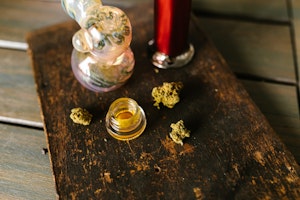
What is Weed?
Whether you’re a novice or a pro, it’s never too late to ask yourself: “what is weed” exactly? You might be surprised by what you learn.
What is Weed?
“Weed” is one of the most popular slang words for cannabis. The term seems to have arisen in the 1920s. In 1929, American Speech reports included it “Among the New Words,” defining it as “marijuana cigarette.” The venerable Oxford English Dictionary in 1932 cited the Chicago Defender as reporting, “The humble ‘reefer,’ ‘the weed,’ the marijuana, or what have you by way of a name for a doped cigarette has moved to Park Ave. from Harlem.”
The ever-hip Raymond Chandler, the master of the detective novel, seems to have been the first author who used “weed” on its own, with no “the” in front of it. “They were looking for … a suitcase full of weed,” Chandler wrote in The Little Sister in 1949.
The term somehow gained a new lease on life in the early 1990s. Using Google’s Ngram Viewer, which shows relative frequency of usage in American printed sources, shows that “weed” started gaining prominence around that time. By 2013, a search of Google Books indicated “smoke marijuana” was used 69 times, “smoke put” 94 times, and “smoke weed” a whopping 149 times.
That impression is confirmed by Urban Dictionary, where users have contributed no fewer than 225 separate definitions for “weed.” Incidentally, the top-voted definition, posted by “AYB” back in 2003, is worth repeating here:
“God’s gift to the world. Brings peace when used wisely.”
How Do People Consume Weed?

The five most popular methods of consuming weed are smoking, vaporization, edibles, ingestibles, and raw cannabis.
• Smoking is the go-to method of consumption for most people who use weed. The psychoactivity of THC is activated by the heat. THC makes it quickly into the bloodstream and thereby to the brain, producing the well-known “high.” While multiple large studies have failed to establish a connection between smoking weed and lung cancer, any type of smoke is an irritant to the lungs and bronchial passageways.
• Vaporization is a great option for those who enjoy the rapid effects of smoking but want to avoid the harmful effects of smoke itself. In vaporization, cannabis is heated to the point where the cannabinoids become a vapor, but not hot enough to actually combust the plant material. This eliminates smoke-derived free radicals that can damage cells. Same with hotboxing.
• Edibles are an excellent way to achieve a long-lasting high, because of the way they are metabolized. They also make possible the ingestion of large doses, which are often necessary for pain patients and others. The chief disadvantage is a longer time before effects are felt. This “waiting period” can be anywhere from 30 minutes to a couple of hours. (Careful not to overindulge. While it won’t actually hurt you, having too much THC can make users uncomfortable, especially if they are novices.) You can take, for example, as drinkable weed making cannabis milk.
• Ingestibles include cannabis oils and tinctures. Full extract cannabis oil (FECO), also known as RSO, is an excellent option for pain control. A solvent such as alcohol is used to extract the cannabinoids from plant material to make FECO. Tinctures are produced in a similar way. Plant material is soaked in food-grade alcohol, which is then strained to produce the tincture.
• Raw cannabis is an increasingly popular method of consuming weed, especially with the advent of juicing and cannabis smoothies. It’s a smoke-free, psychoactivity-free method of consumption. Raw cannabis is the only way to preserve cannabinoid acids, the raw forms of THC, CBD, and the other cannabinoids. A major benefit of raw cannabis is that you can consume hundreds of times more cannabinoids than you can with activated weed. Raw cannabinoid acids don’t directly engage the cannabinoid receptors, so they don’t get you high.
Age and Gender Demographics of Weed Use

While weed culture has traditionally centered around young, male smokers, the legalization and normalization of cannabis (finally, we don’t need a dealer) have made it more accessible than ever before to everyone. Even so, certain patterns have held.
According to an analysis of cannabis retailer transaction data, including customer loyalty programs, Headset in 2016 got a lot of information about who buys legal weed. The data suggest that people in the customer loyalty programs are overwhelmingly male (about 70 percent of all members). Customers ranged in age from 21 to 95, but more than 50 percent of loyalty members were under 40.
The largest percentage of customer loyalty members were 25 to 29 years old (20 percent). This was followed by 21 to 24-year-olds, at 16 percent. But the average customer is 37.6 years old, with males averaging 37.4 and female customers averaging 38.2 years old. People from 65 to 95 years old makeup fewer than 5 percent of customers.
As for gender differences, 68.9 percent of dispensary customers were men. That ratio is well over 2:1, but is not shocking given weed culture’s traditional emphasis on the male user.
Men are more likely than women to buy concentrates. Women are more likely to buy pre-rolls and edibles, according to the data.
Other articles you can be interested in:
- Cannabis PTSD: How Cannabis Successfully Combats PTSD
- Adderall and Weed: What’s the deal with weed and Adderall?
- Best Indica Strains
Herb Recommended Products:
READ MORE










